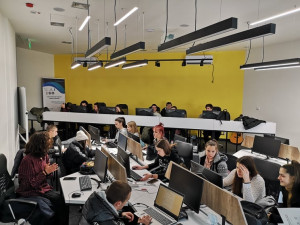Innovative Skill Training Project Boosts Employment for Youth in Ivanjica, Serbia
Related Sustainable Development Goals and Global Compact for Migration Objectives
The majority of unemployed people in the municipality of Ivanjica, Serbia, are young people. Without new opportunities in their hometowns, many youths migrate to larger cities and other countries to look for work. When migration is a choice, it can bring positive benefits to those who migrate as well as the broader community. On the other hand, when people move out of necessity, migrants, especially women, are more exposed to dangerous or poor working conditions, discrimination, and a lack of social protection. But by providing youth with opportunities wherever they are, communities can benefit from the new ideas, creativity, vitality and skills of the next generation, ultimately fostering local prosperity and socio-economic development. Ivanjica knows this well; their Local Youth Action Plan includes and considers migration.

With this in mind, the project “A Model for Improving the Competencies of Unemployed Youth to Mitigate the Negative Consequences of Migration” is aimed at addressing the high unemployment rate in Ivanjica by providing new opportunities and strengthening the skills of the next generation. The project is implemented by the Local Youth Office of the Ivanjica Municipality in cooperation with 9 local businesses including Matis, a local technical academy, a local youth club, and with support from IOM and UNDP. It is an example of how whole-of-community partnerships between local governments, companies, training schools and international organizations can make a difference.
As part of the Global IOM-UNDP Joint Programme on Making Migration Work for Sustainable Development, the project establishes and develops a sustainable model for improving the competencies of unemployed youth based on their personal skills and preferences and the needs of employers in the market. Two analyses were carried out, one to understand the needs of both unemployed youth and the labour market and one to understand youth needs for self-employment defining priority areas for business start-ups. Out of 144 who participated in the survey, 72.2% were interested in starting their own business. 28 employers, 238 high-school students, and 118 final-year primary-school students were surveyed for the first analysis for which tailor-made questionnaires were developed and used.
The task of the analysis was to compare students’ wishes for further education with the needs of employers, in line with the strategic development of their companies, enterprises, businesses and similar, in the public and private sectors over the next 5 years. The analysis identified skills in demand to ensure that the training programmes led to job opportunities in areas where employers were seeking new staff. Participants of the project become certified in their new skills which makes it easier to find jobs, and for prospective employers to find good matches for their needs.
As of June 2022, 220 youth had been trained in the municipality under this Programme in English, computer skills and business development and were supported to access internships, work placement or to start their own businesses. 10 people were trained to become CNC operators – machine maintenance experts – by the company Matis and Oxford Academy, a local technical school. Matis offered all of these young professionals jobs after certification, including one young woman. Community projects such as this contribute to achieving the Sustainable Development Goals (SDGs) notably SDG 1 on no poverty, SDG 4 on quality education, SDG 8 on decent work and economic growth, SDG 10 on reduced inequalities and SDG 17 on partnerships for the goals.
Learn more about the project here.
